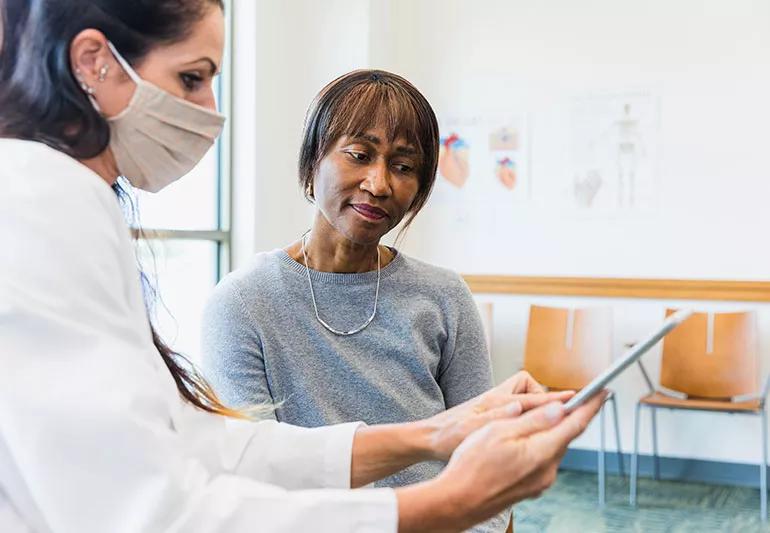How uterine fibroids can change with your body

Image content: This image is available to view online.
View image online (https://assets.clevelandclinic.org/transform/6f3c9d50-3b07-47ad-9510-32413d5d9a95/UterineFibroidMenopause-1339289896-770x533-1_jpg)
A medical professional and female patient talking
Uterine fibroids are incredibly common — up to 80% of women and people assigned female at birth (AFAB) will develop them by age 50 — and can cause a variety of different symptoms, from incredibly mild to more intense. And while we don’t know what causes them, one thing we have learned is that these benign growths do change over time.
Advertisement
Cleveland Clinic is a non-profit academic medical center. Advertising on our site helps support our mission. We do not endorse non-Cleveland Clinic products or services. Policy
“We don’t know why they form,” says Ob/Gyn and women’s health specialist Linda Bradley, MD, “but we do know they usually form when your body is making estrogen.” As your body changes, so does your likelihood of developing uterine fibroids. Entering menopause is frequently associated with a decrease in fibroid-related symptoms.
During menopause, your body goes through a natural transition. After 12 consecutive months without a menstrual cycle, it marks the end of women’s reproductive years.
The lead-up to menopause is called perimenopause. During this time, most women will start experiencing some menopausal changes and symptoms.
Here are some of the changes that happen to your body during menopause:
So, how does menopause affect uterine fibroids?
It turns out, female hormones play a role in the formation of uterine fibroids. Hormones such as estrogen and progesterone increase the risk of getting fibroids. These hormones are most prevalent during your childbearing years (in premenopausal women).
When your body enters menopause, these hormones decrease.
“During menopause, your ovaries become quiet and no longer make estrogen,” explains Dr. Bradley.
Advertisement
As you get closer to menopause, your uterine fibroids may shrink and become less noticeable. For many, their fibroid-related symptoms go away completely. Also, when you begin menopause, your risk of developing new uterine fibroids decreases.
“When you stop your periods, the fibroids go to sleep,” says Dr. Bradley. “The ovaries make everything hibernate.”
While it’s extremely rare, fibroids can sometimes form in people who are postmenopausal but it’s currently unclear why this occurs. Even so, uterine fibroids — if they happen at all — will create much less severe symptoms post-menopause (or none at all).
Treatment options for uterine fibroids will depend on your age and the severity of your symptoms. There’s a variety of hormonal therapies and surgical interventions available before you reach menopausal age. But it’s important to remember that everyone’s body is different and everyone’s fibroids are different as well. “There’s no one magic pill,” says Dr. Bradley. “It’s like a thumbprint or a snowflake. They’re each unique and one of a kind. Because they’re all different sizes and in different locations, they can cause different symptoms.”
The good news is, uterine fibroids will likely leave you alone by the time you reach a certain age. Menopause itself will help reduce uterine fibroid symptoms. So, unless your healthcare provider says otherwise, you most likely won’t need additional treatment.
It’s also important to make sure that what you’re dealing with is indeed uterine fibroids.
According to Dr. Bradley, some women experience heavy bleeding after menopausal age. And more often than not, she says this is not a sign of uterine fibroids returning or getting worse.
“Most likely there’s something else going on,” notes Dr. Bradley. “And that’s what we have to make sure women know. Don’t assume that they’re fibroids.”
For people who have experienced uterine fibroids in the past, they may assume that any intense bleeding later in life is also linked to their fibroids. However, Dr. Bradley stresses that it’s very rare for fibroids to be creating any symptoms post-menopause. So, if you’re experiencing bleeding post-menopause, it’s your body sending you a different sign. In this case, be sure to check in with your healthcare provider as soon as possible.
Your doctor will run other tests or scans to check for the causes of your symptoms. Likely, they will do a pelvic exam to figure out what else could be happening.
“You may need an evaluation of your endometrial health,” Dr. Bradley says.
Again, Dr. Bradley stresses that it’s rare for your fibroids to cause bleeding during menopause.
And if it turns out that you do still have uterine fibroids later in life, but they aren’t causing any symptoms, most likely they won’t need to be treated at all, advises Dr. Bradley.
Advertisement
“Our mantra is that if they don’t bother us, we don’t bother them,” she says.
Advertisement

Delivered every Tuesday!
Sign up for our Health Essentials emails for expert guidance on nutrition, fitness, sleep, skin care and more
It's a letter about the news!
Learn more about our editorial process.
Advertisement
Depending on size and location, they can affect your rectum, stomach, bladder and kidneys
Eating more fruits and veggies and less red meat could help prevent or shrink fibroids
Mild symptoms may be manageable, but severe bleeding, pain and depression demand treatment
If you’re living through fatigue due to fibroids, there are ways to cope
The Short Answer from an OB/Gyn
Treatments can help, besides a hysterectomy
Depending on their size, these noncancerous growths can create an abdominal bulge
From medications and stress to PCOS and STIs, there’s a wide range of reasons Aunt Flo may overstay her welcome
Type 2 diabetes isn’t inevitable with these dietary changes
Applying a hot or cold compress can help with pain
Pump up your iron intake with foods like tuna, tofu and turkey